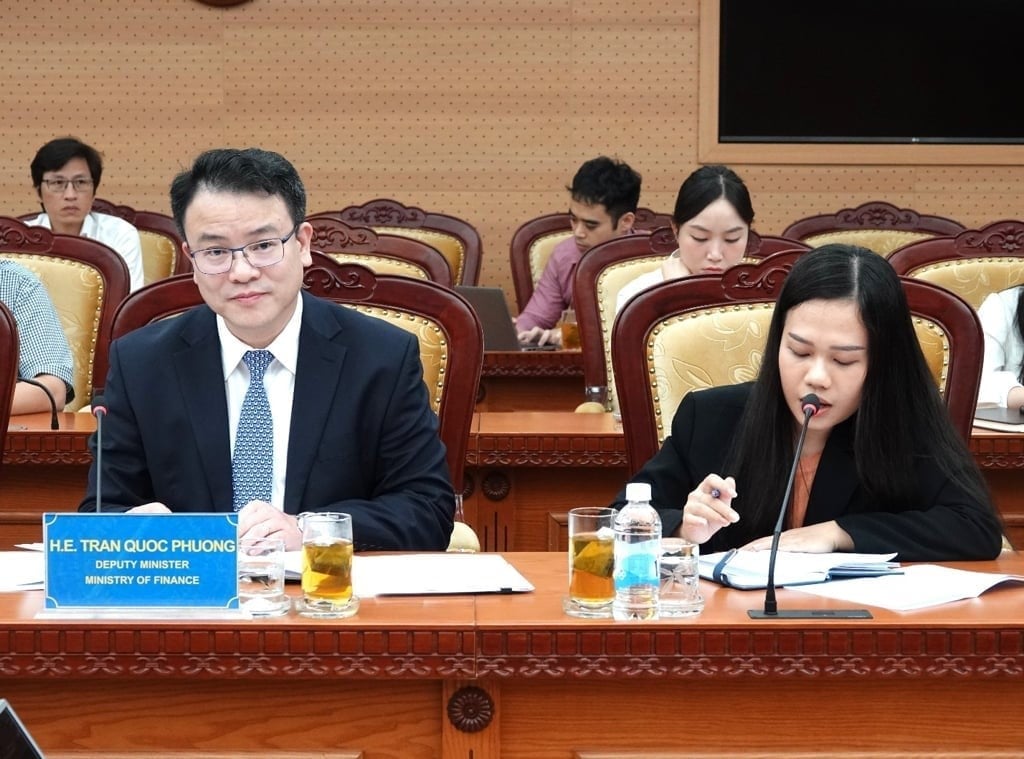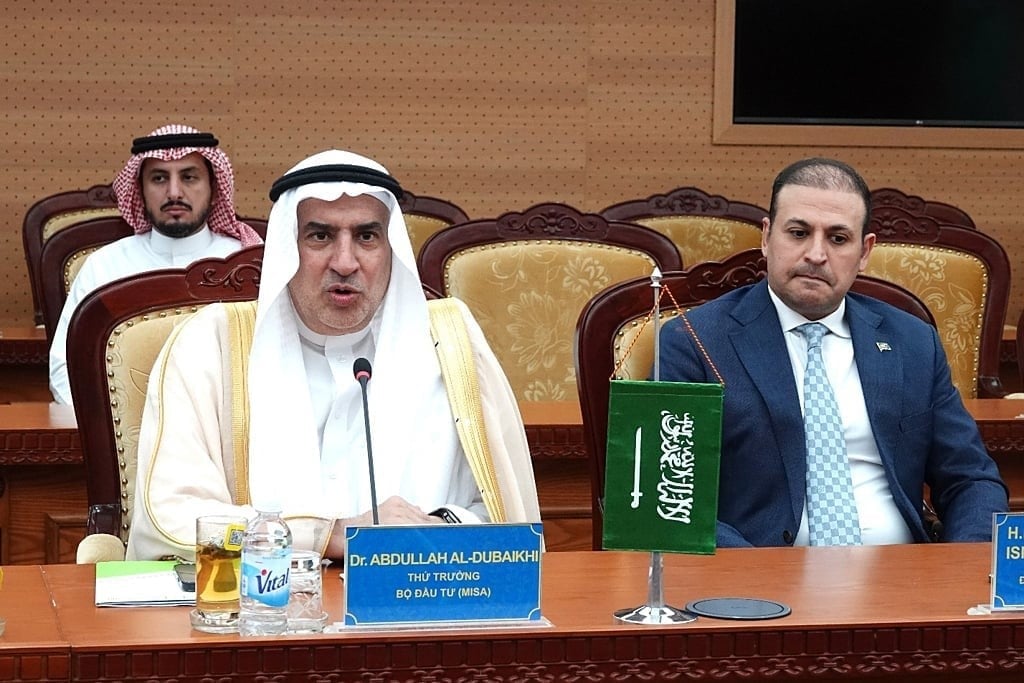December 30, 2025 | 14:03 GMT +7
December 30, 2025 | 14:03 GMT +7
Hotline: 0913.378.918
December 30, 2025 | 14:03 GMT +7
Hotline: 0913.378.918
On the afternoon of September 4, Deputy Minister of Finance Tran Quoc Phuong welcomed a working delegation from Saudi Arabia's Ministry of Investment, led by Deputy Minister Abdullah Al-Dubaikhi.
Deputy Minister Tran Quoc Phuong appreciated the coordination of the Ministry of Investment and the Saudi Arabian Embassy in organizing business-to-business connections between the two countries. The Deputy Minister noted that this is an opportunity for enterprises to share information, seek cooperation opportunities, and contribute to further deepening bilateral relations.

Deputy Minister of Finance Tran Quoc Phuong speaks at the working session with Saudi Arabia's Ministry of Investment on September 4. Photo: MOF.
According to the Deputy Minister, the investment environment in Vietnam continues to receive positive evaluations from the international community. Many corporations chose Vietnam as a strategic manufacturing hub linked to global supply chains.
With its strengths in agriculture and the processing industry, Vietnam wishes to leverage its cooperative relationship with Saudi Arabia to pave the way into the Halal market, which has high demand for food products that meet Islamic standards.
He proposed that the two sides soon sign a memorandum of understanding on promoting direct investment and establish a joint working group on investment between Vietnam's Foreign Investment Agency and Saudi Arabia's Ministry of Investment. This working group will be a focal point for coordination, helping Vietnamese businesses update Halal standards and policies, thereby enabling more effective penetration of agricultural and seafood products into this market.
Beyond agricultural products, the Deputy Minister also emphasized other potential fields of cooperation, including renewable energy, information technology, manufacturing and processing industries, and innovation. The Ministry of Finance committed to creating the most favorable conditions for Saudi Arabian enterprises to invest, operate successfully, and develop sustainably in Vietnam.
In response, Deputy Minister Abdullah Al-Dubaikhi affirmed that Saudi Arabia values its economic cooperation with Vietnam. He agreed with the proposal to establish a joint working group and expressed hope that the two countries would soon sign an Agreement on Investment Promotion and Protection as well as a Double Taxation Avoidance Agreement. He particularly highlighted collaboration in sustainable agriculture, Halal food supply, logistics chains, and energy.
According to Deputy Minister Al-Dubaikhi, the working delegation had identified several priority sectors for cooperation discussions, including sustainable agriculture, energy, Halal product supply, and supply chain-related fields, including automobile production.
He noted that several major Saudi Arabian enterprises are investing in Vietnam and expressed hope that Vietnam would continue to facilitate the expansion of cooperation. Saudi Arabia's investment approach is "quality over quantity," focusing on sectors where Vietnam truly has demand and alignment with the market, including the production of agricultural and food products meeting Halal standards.

Deputy Minister Abdullah Al-Dubaikhi and Ambassador Mohamed Ismaeil A. Dahlwy at the meeting. Photo: MOF.
Following the meeting, units under the Ministry of Finance, together with affiliated state-owned groups and corporations, held a direct business connection session with the Saudi Arabian business delegation. During the session, enterprises from both sides engaged in concrete discussions on cooperation opportunities, focusing on practical, effective solutions that deliver long-term benefits for both parties.
Key contents included the potential to boost Vietnamese agricultural exports to Saudi Arabia and the development of cold storage facilities, logistics, and seaport infrastructure to strengthen connectivity between Vietnam, the Middle East, and Europe. The two sides also agreed to share project portfolios, conduct actual surveys, and coordinate on updates to relevant technical and legal regulations.
Strengthening agricultural exports to Saudi Arabia has strategic significance not only for Vietnam’s agricultural sector but also for the entire economy. The Middle East market in general and Saudi Arabia in particular are assessed to have strong and stable consumption demand, especially for Halal-certified products.
Successfully accessing this market would not only expand the output for Vietnam’s key agricultural products, including rice, coffee, seafood, and tropical fruits, but also enhance the national brand value by meeting strict standards for quality, safety, and production processes.
This effort is also seen as an important stepping stone for Vietnamese agricultural products to reach other demanding markets in Europe and North Africa through Saudi Arabia’s logistics network. With the goal of raising bilateral trade turnover to USD 10 billion by 2030, capitalizing on Halal opportunities will help ensure sustainable development for the agricultural sector, delivering practical benefits to farmers and export businesses.
With political determination and the companionship of the business community, the establishment of a joint working group is expected to become a strategic "bridge," helping Vietnamese agricultural products meet Halal standards and gain access to the wider Middle Eastern market.
Saudi Arabia is currently Vietnam's largest trading partner in the Middle East, with bilateral trade reaching USD 2.7 billion in 2024, up more than 20% compared to 2023. The two countries aim to increase this figure to USD 10 billion by 2030. In addition, the Saudi Fund for Development has pledged over USD 164 million in loans to Vietnam for the implementation of 12 infrastructure, healthcare, and human resource development projects.
Translated by Thu Huyen
/2025/12/29/2812-1-182339_699.jpg)
(VAN) The price of mangrove forest carbon credits is high because this forest type not only delivers significant environmental value but also plays a crucial role in addressing other issues.
/2025/12/29/5840-0-115141_514.jpg)
(VAN) From 2026, many EU markets will require shrimp to be electrically stunned before ice immersion, forcing exporters to change technologies to retain market share.
/2025/12/28/4951-2-104623_113.jpg)
(VAN) Rubber exports are forecast to remain under downward pressure in the coming period, as global rubber consumption shows signs of slowing, according to ANRPC's projections.
/2025/12/28/5120-1-093308_94.jpg)
(VAN) Many agricultural products are of sufficient quality to join global supply chains, yet fail to pass the first gateway when entering international markets due to packaging and information in English.
/2025/12/27/2453-2-172141_426.jpg)
(VAN) The sharp decline in the number of EU warnings in 2025 is regarded as a positive signal for the future orientation of Viet Nam’s agricultural exports.
/2025/12/27/1547-2-220434_536.jpg)
(VAN) For many businesses, exporting is a costly trial. But for those choosing a long-term path, small orders are a way to keep markets and learn the rules.
/2025/12/27/2522-1-090748_662.jpg)
(VAN) The 'Large-Scale Rice Field' project has been implemented in An Giang across a total area of more than 5,582 ha, comprising 73 large-scale fields and attracting the participation of 2,027 farmer households.